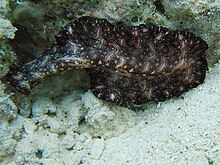The paraphyletic "Platyzoa" /ˌplætɪˈzoʊ.ə/ are a group of protostome unsegmented animals proposed by Thomas Cavalier-Smith in 1998. Cavalier-Smith included in Platyzoa the phylum Platyhelminthes (or flatworms), and a new phylum, the Acanthognatha, into which he gathered several previously described phyla of microscopic animals. Later it has been described as paraphyletic, containing the Rouphozoa and the Gnathifera.
| Platyzoa | |
|---|---|

| |
| Pseudobiceros bedfordi (Bedford's flatworm) | |
| Scientific classification | |
| Domain: | Eukaryota |
| Kingdom: | Animalia |
| Subkingdom: | Eumetazoa |
| Clade: | ParaHoxozoa |
| Clade: | Bilateria |
| Clade: | Nephrozoa |
| (unranked): | Protostomia |
| (unranked): | Spiralia |
| Superphylum: | Platyzoa Cavalier-Smith, 1998 |
| Phyla | |
| |
Phyla edit
One scheme placed the following phyla in Platyzoa:
Characteristics edit
None of the Platyzoa groups have a respiration or circulation system because of their small size, flat body or parasitic lifestyle. The Platyhelminthes and Gastrotricha are acoelomate. The other phyla have a pseudocoel, and share characteristics such as the structure of their jaws and pharynx, although these have been secondarily lost in the parasitic Acanthocephala. They form a monophyletic subgroup called the Gnathifera.
The name "Platyzoa" is used because most members are flat, though rotifers are not.[3]
Classification edit
The Platyzoa are close relatives of the Lophotrochozoa. Together the two make up the Spiralia.
Syndermata was a proposed clade that included Acanthocephala and rotifers, but as it appears they are not sister groups after all, the clade has been abandoned.[4]
A recent possible cladogram is shown which would show that the Lophotrochozoa emerged within Platyzoa as a sister group of the Rouphozoa (the Gastrotricha and Platyhelminthes).[1] The Lophotrochozoa and Rouphozoa are then named the Platytrochozoa.[1] This makes the Platyzoa a paraphyletic group.[clarification needed]
References edit
- ^ a b c Struck, Torsten H.; Wey-Fabrizius, Alexandra R.; Golombek, Anja; Hering, Lars; Weigert, Anne; Bleidorn, Christoph; Klebow, Sabrina; Iakovenko, Nataliia; Hausdorf, Bernhard (2014-07-01). "Platyzoan Paraphyly Based on Phylogenomic Data Supports a Noncoelomate Ancestry of Spiralia". Molecular Biology and Evolution. 31 (7): 1833–1849. doi:10.1093/molbev/msu143. ISSN 0737-4038. PMID 24748651.
- ^ Sørensen, Martin (14 December 2005). "Limnognathia". Zoological Museum, University of Copenhagen. Archived from the original on 24 December 2018. Retrieved 28 December 2016.
- ^ "Explanations.html". Archived from the original on 2013-02-07. Retrieved 2009-06-28.
- ^ Gnathifera - Richard C. Brusca
- The Taxonomicon - Taxon: Infrakingdom Platyzoa Cavalier-Smith, 1998 - retrieved January 31, 2006
- Triploblastic Relationships with Emphasis on the Acoelomates and the Position of Gnathostomulida, Cycliophora, Plathelminthes, and Chaetognatha: A Combined Approach of 18S rDNA Sequences and Morphology - retrieved January 31, 2006
- Myzostomida Are Not Annelids: Molecular and Morphological Support for a Clade of Animals with Anterior Sperm Flagella - retrieved January 31, 2006
- Current advances in the phylogenetic reconstruction of metazoan evolution. A new paradigm for the Cambrian explosion? - retrieved January 31, 2006